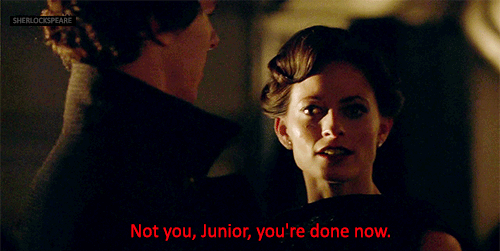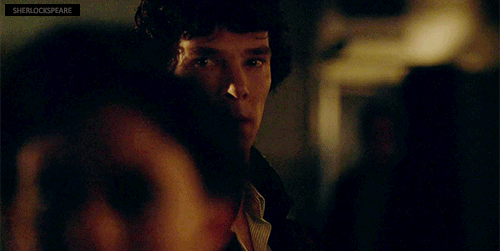
BBC Sherlock Fan Forum - Serving Sherlockians since February 2012.
- Liberty
- Moderator
 Offline
Offline 
- Registered: June 29, 2014
- Posts: 5,983
Re: Sherlock’s Sexuality: An In-Depth Contemplation and Study
@ ancientsgate I agree with all that, but I suppose the idea I was trying to get across was the idea of abstinence being considered superior to having sex only in marriage. Most people would have to find an outlet for their sexual desires and marriage served that purpose, but it would be better if they were just able to control themselves. Obviously, this isn't my view (or ACD's, I'm sure), but I think it does have a little bit in common with Sherlock's view. He wouldn't limit sex/love to marriage - he just avoids the whole thing, because he believes his mind is superior without it.
So I do think Sherlock's abstinence seems to draw on a couple of rather outdated ideas - the idea that abstinence was superior, and the idea that indulging could be mentally debilitating. So I can see why it might be thought of as "Victorian". In the modern version, I think they update it a little - the experience with Irene goes some way to forming his view (the final proof), as he's put at a disadvantage and makes a mistake due to falling for somebody - but I think the basic idea must have been in place for him long ago. He seems to have it very much under control in all other circumstances.
- nakahara
- Threatened Knighthood
 Offline
Offline 
- Registered: February 22, 2014
- Posts: 11,979
Re: Sherlock’s Sexuality: An In-Depth Contemplation and Study
Maybe he just fears the vulnerability that comes with intimate relations to other people (in all versions). And the thought of "superiority" is just a front to that.

Last edited by nakahara (April 2, 2015 7:35 am)
-----------------------------------
I cannot live without brainwork. What else is there to live for? Stand at the window there. Was there ever such a dreary, dismal, unprofitable world? See how the yellow fog swirls down the street and drifts across the dun-coloured houses. What could be more hopelessly prosaic and material? What is the use of having powers, Doctor, when one has no field upon which to exert them?

- Vhanja
- One More Miracle
 Offline
Offline 
- From: Sandnes, Norway
- Registered: December 11, 2014
- Posts: 6,607
Re: Sherlock’s Sexuality: An In-Depth Contemplation and Study
I always thought his sexual abstence was because having any kind of romantic/sexual relationship with someone would distract him from his work, both time-wise and his ability to think straight. We all know how all-consuming a crush or physical desire can be in your head. That is what he wants to avoid.
Last edited by Vhanja (April 2, 2015 8:10 am)
__________________________________________________________________________________________________________________________________________
"We'll live on starlight and crime scenes" - wordstrings

Team Hudders!
- NatureNoHumansNo
- Adler's Whip
 Offline
Offline - Registered: March 19, 2014
- Posts: 206
Re: Sherlock’s Sexuality: An In-Depth Contemplation and Study
Victorian era or not, I don't think Sherlock Holmes is the kind to comply to social standarts because they just are standarts.
If he's abstinent ( which is not clearly said either in the books nor in the BBC version) and doesn't get involved in relationship ( which is clarly stated in both) it's by choice.
- Liberty
- Moderator
 Offline
Offline 
- Registered: June 29, 2014
- Posts: 5,983
Re: Sherlock’s Sexuality: An In-Depth Contemplation and Study
@ Nature, I don't think he's conforming - I'm just saying that the idea probably more currency back then (and maybe didn't seem as odd to readers of the time as it does to us). I suppose that's what was meant by it being "Victorian". I agree that the sex isn't spelled out in either, but I think it's implicit, especially in the modern version - I don't get the impression he's having sex with anyone - I get the impression that the reasons for avoiding it are the same as his reasons for avoiding romances. It's open to interpretation, though - and maybe worth discussing?
@ Vhanja Yes, "grit in a sensitive instrument".
@ Nakahara Yes, I definitely feel there's an element of that there - he doesn't want to become vulnerable (great gifs!), and ASIB confirms for him that it's a risk. But I do think there's a bit of superiority as well - it's because his mind is so fine that it needs protecting in this way. It's OK for other people to indulge because they don't have his intellectual capacity. He's above all that.
I think he does feel some regret for choosing that way at the end of TSOT (the TV version, although in the book as well, maybe). He's not part of that life, and knows that it makes him more alone, even if he sees it as flawed.
- NatureNoHumansNo
- Adler's Whip
 Offline
Offline - Registered: March 19, 2014
- Posts: 206
Re: Sherlock’s Sexuality: An In-Depth Contemplation and Study
Maybe the difference is about what readers expect to know about a fictionnal character.
In the victorian era, maybe readers wondered more about marital/ social status and less about sexual life.
I mean, you don't know if Mr Darcy or Ebenezer Scrooge are virgins or not, if they went to the brothel or experienced with their mates at school. You just learn they're bachelor.
That's maybe why ACD made Holmes opinion about marriage and relationships so clear, and didn't need to do the same about his sex life.
- REReader
- Mycroft's Contact
 Offline
Offline 
- Registered: July 29, 2014
- Posts: 519
Re: Sherlock’s Sexuality: An In-Depth Contemplation and Study
Now that is very true--assumption would be made, of course, in the Victorian era, but literature for general audiences DEFINITELY would not be discussing anyone's sex life!
____________________
"Oh, you meant 'spectacularly ignorant' in a NICE way."
- SusiGo
- The game is never over (moderator)
 Offline
Offline 
- From: Germany
- Registered: June 5, 2012
- Posts: 22,965
Re: Sherlock’s Sexuality: An In-Depth Contemplation and Study
Liberty wrote:
I think he does feel some regret for choosing that way at the end of TSOT (the TV version, although in the book as well, maybe). He's not part of that life, and knows that it makes him more alone, even if he sees it as flawed.
I think in Canon Holmes' reaction to Watson's wedding is (at least verbally) even stronger than in TSoT:
“The division seems rather unfair," I remarked. "You have done
all the work in this business. I get a wife out of it, Jones gets
the credit, pray what remains for you?"
"For me," said Sherlock Holmes, "there still remains the
cocaine-bottle." And he stretched his long white hand up for
it.”
------------------------------
"To fake the death of one sibling may be regarded as a misfortune; to fake the death of both looks like carelessness." Oscar Wilde about Mycroft Holmes
"It is what it is says love." (Erich Fried)
“Enjoy the journey of life and not just the endgame. I’m also a great believer in treating others as you would like to be treated.” (Benedict Cumberbatch)

- NatureNoHumansNo
- Adler's Whip
 Offline
Offline - Registered: March 19, 2014
- Posts: 206
Re: Sherlock’s Sexuality: An In-Depth Contemplation and Study
the sign of the four in only the second novel, the friendship between Holmes and Watson hasn't been hugely developed yet by ACD to this point.
So I don't think the use of cocaine is a reaction to Watson's wedding. Proof is that he uses it even when Watson lives in Baker street.
It merely shows how his life is as a lonely detective when a case is over.
Last edited by NatureNoHumansNo (April 2, 2015 9:42 pm)
- tonnaree
- The "B" is SILENT! (Mod)
 Offline
Offline 
- From: Atlanta, Georgia, USA
- Registered: May 31, 2013
- Posts: 9,270
Re: Sherlock’s Sexuality: An In-Depth Contemplation and Study
SusiGo wrote:
Liberty wrote:
I think he does feel some regret for choosing that way at the end of TSOT (the TV version, although in the book as well, maybe). He's not part of that life, and knows that it makes him more alone, even if he sees it as flawed.
I think in Canon Holmes' reaction to Watson's wedding is (at least verbally) even stronger than in TSoT:
“The division seems rather unfair," I remarked. "You have done
all the work in this business. I get a wife out of it, Jones gets
the credit, pray what remains for you?"
"For me," said Sherlock Holmes, "there still remains the
cocaine-bottle." And he stretched his long white hand up for
it.”
We, he did end up in a crack house the very next episode.
----------------------------------------------------------------------
Proud President and Founder of the OSAJ.
Honorary German
"Anyone who takes himself too seriously always runs the risk of looking ridiculous; anyone who can consistently laugh at himself does not".
-Vaclav Havel
"Life is full of wonder, Love is never wrong." Melissa Ethridge
I ship it harder than Mrs. Hudson.


- Liberty
- Moderator
 Offline
Offline 
- Registered: June 29, 2014
- Posts: 5,983
Re: Sherlock’s Sexuality: An In-Depth Contemplation and Study
On a case, as it turns out! But yes, I do think there are there similarities in the feel of both those scenes (book and TV) - that Sherlock seems to be aware that there's a life he's rejected, and that the life that he's chosen sets him apart.
(Moftiss have mentioned that the end of TSOT references a particular episode of Doctor Who that they watched as children, where Jo gets engaged and the Doctor leaves the party alone. The Doctor is set apart by being a time lord rather than a human. Sherlock is partly set apart by his brilliant mind, but also by his own choice to set himself above human affairs.)
- ukaunz
- High Functioning Sociopath
 Offline
Offline 
- From: Australia
- Registered: February 13, 2015
- Posts: 2,584
Re: Sherlock’s Sexuality: An In-Depth Contemplation and Study
NatureNoHumansNo wrote:
the sign of the four in only the second novel, the friendship between Holmes and Watson hasn't been hugely developed yet by ACD to this point.
So I don't think the use of cocaine is a reaction to Watson's wedding. Proof is that he uses it even when Watson lives in Baker street.
It merely shows how his life is as a lonely detective when a case is over.
Having just finished reading The Sign of the Four, I remember Watson stating that he had lived with Holmes for "years" at the time that this story started, so while the reader hasn't seen the friendship develop, we have to assume that they are quite good friends by this stage. Watson also says that he had been watching Holmes use cocaine and morphine for many months (three times a day) and that he hadn't the courage to say anything against it. So I agree that the cocaine use has nothing to do with Watson leaving to marry Mary. Holmes uses drugs to stimulate and clarify his mind, especially when he has no case. I'm not sure it has anything to do with loneliness though.
Last edited by ukaunz (April 3, 2015 8:22 am)
----------------------------------------------------------------------------------------------------------------------------------------------------


- Lola Red
- British Government
 Offline
Offline 
- Registered: November 17, 2014
- Posts: 761
Re: Sherlock’s Sexuality: An In-Depth Contemplation and Study
I agree that the drug taking is not directly related to John’s absence or presents. Even in the show we get hints that he had setbacks during the time he and John shared 221b. Moftiss have often explained that while his drug taking in the canon made him more mysterious, in the show, it makes him deeply flawed (they used slightly less polite language here). I think in our modern times, it is actually his decision to not engage in sex that makes him more mysterious. Today, homo- and bisexuality are more and more accepted, but someone who is asexual will often hear that he or she has not yet found the right person. The same is true for sexually active people (though I think this is stronger for women) who do not want to commit to a relationship (at least above a certain age). Sherlock seems to have the urges (many saw his reaction to Irene as sexually motivated and many others see a sexual longing for John), but he does very little about them. A bit of fairly standard porn, apparently, but he does not even risk sex with someone he does not love, but does fake a relationship with. Maybe he does not want to give anyone the power to arouse him. There is some truth is the old joke that at any given moment a man’s blood can only supply his brain or what is between his legs, never both simultaneously(sorry gentlemen). So maybe Sherlock just want s to make sure that he is always the one in control.
Last edited by Lola Red (April 3, 2015 7:32 pm)
****************************************************************************************************************************************
We balance probabilities and choose the most likely. It is the scientific use of the imagination.

- SusiGo
- The game is never over (moderator)
 Offline
Offline 
- From: Germany
- Registered: June 5, 2012
- Posts: 22,965
Re: Sherlock’s Sexuality: An In-Depth Contemplation and Study
Interesting thoughts, Lola. So you say that he does not just suppress his emotions (at least until series 3) but also his sexual urges because giving in to them might make him feel less in control or vulnerable, correct? So this quote from HoB I have always found very revealing might apply to his sexuality as well:
"Always been able to keep myself distant ... myself from ... feelings."
------------------------------
"To fake the death of one sibling may be regarded as a misfortune; to fake the death of both looks like carelessness." Oscar Wilde about Mycroft Holmes
"It is what it is says love." (Erich Fried)
“Enjoy the journey of life and not just the endgame. I’m also a great believer in treating others as you would like to be treated.” (Benedict Cumberbatch)

- tonnaree
- The "B" is SILENT! (Mod)
 Offline
Offline 
- From: Atlanta, Georgia, USA
- Registered: May 31, 2013
- Posts: 9,270
Re: Sherlock’s Sexuality: An In-Depth Contemplation and Study
I want to be around when all that supression goes "Boom Boom." ![]()
Was that off topic? *tries to look innocent*
----------------------------------------------------------------------
Proud President and Founder of the OSAJ.
Honorary German
"Anyone who takes himself too seriously always runs the risk of looking ridiculous; anyone who can consistently laugh at himself does not".
-Vaclav Havel
"Life is full of wonder, Love is never wrong." Melissa Ethridge
I ship it harder than Mrs. Hudson.


- Vhanja
- One More Miracle
 Offline
Offline 
- From: Sandnes, Norway
- Registered: December 11, 2014
- Posts: 6,607
Re: Sherlock’s Sexuality: An In-Depth Contemplation and Study
I remember Benedict once said in an interview that the main reason why Sherlock didn't want to have sex was that he was terrified of losing control. Which goes well with everything people have said in this thread, I think.
__________________________________________________________________________________________________________________________________________
"We'll live on starlight and crime scenes" - wordstrings

Team Hudders!
- Schmiezi
- Reichenbach Survivor
 Offline
Offline 
- From: NRW, Germany
- Registered: August 10, 2012
- Posts: 5,478
Re: Sherlock’s Sexuality: An In-Depth Contemplation and Study
Vhanja wrote:
I remember Benedict once said in an interview that the main reason why Sherlock didn't want to have sex was that he was terrified of losing control. Which goes well with everything people have said in this thread, I think.
I am not the only one who really wants to see him lose that control, right? Right? ![]()
![]()
---------------------------------------------------------------------------------------------------------------------------------------------------------------------------------
I still believe that love conquers all!


"Quick, man, if you love me."
- Harriet
- Most Human Human Being
 Offline
Offline 
- From: 110A Piccadilly
- Registered: August 24, 2012
- Posts: 9,887
Re: Sherlock’s Sexuality: An In-Depth Contemplation and Study
Time for this ![]()

creator:
Eventually everyone will support Johnlock. Independent OSAJ Affiliate
... but there may be some new players now. It’s okay. The East Wind takes us all in the end.
- SusiGo
- The game is never over (moderator)
 Offline
Offline 
- From: Germany
- Registered: June 5, 2012
- Posts: 22,965
Re: Sherlock’s Sexuality: An In-Depth Contemplation and Study
Yeah, this is brilliant. Bingo! ![]()
And I would like to look again at this quote:
Steven Moffat: “Sherlock Holmes, again, must have sexual impulses. (…) The fact is, he decides to put all that in an iron box to make his brain work better. He wants to rise above us like a snowcapped mountain, but he’s actually a volcano, and that’s where the story is. That’s where the story is.”
So if I understand correctly the story is not about solving crimes but about Sherlock being a dormant volcano teetering on the brink of breaking out. Nicely put, Steven. ![]()
------------------------------
"To fake the death of one sibling may be regarded as a misfortune; to fake the death of both looks like carelessness." Oscar Wilde about Mycroft Holmes
"It is what it is says love." (Erich Fried)
“Enjoy the journey of life and not just the endgame. I’m also a great believer in treating others as you would like to be treated.” (Benedict Cumberbatch)

- tonnaree
- The "B" is SILENT! (Mod)
 Offline
Offline 
- From: Atlanta, Georgia, USA
- Registered: May 31, 2013
- Posts: 9,270
Re: Sherlock’s Sexuality: An In-Depth Contemplation and Study
Schmiezi wrote:
Vhanja wrote:
I remember Benedict once said in an interview that the main reason why Sherlock didn't want to have sex was that he was terrified of losing control. Which goes well with everything people have said in this thread, I think.
I am not the only one who really wants to see him lose that control, right? Right?
I'll make the popcorn Schmiezi. ![]()
----------------------------------------------------------------------
Proud President and Founder of the OSAJ.
Honorary German
"Anyone who takes himself too seriously always runs the risk of looking ridiculous; anyone who can consistently laugh at himself does not".
-Vaclav Havel
"Life is full of wonder, Love is never wrong." Melissa Ethridge
I ship it harder than Mrs. Hudson.



